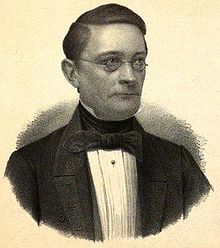Christian CA Lange
Christian Christoph Andreas Lange , (born August 13, 1810 in Bærum ; † May 10, 1861 in Christiania ) was a Norwegian historian and archivist.
His parents were the farmer Balthazar Michael Lange (1782–1812) and his wife Ovidia Margrethe Christine Messel (1787–1883). On August 24, 1836, he married Maren Kristine Breda (June 2, 1816– November 30, 1894), daughter of Lieutenant Colonel Halvor Breda (1781 / 82–1844) and his wife Elen Johanne Koch (1786 / 87–1844).
When inflation broke out in Denmark-Norway in 1813, the family lost most of their wealth. Nevertheless, he was able to attend the cathedral school in Christiania and in 1827 took his exams and began studying theology. At the university he got in touch with his mother's cousin Rudolf Keyser , who later became professor of history. In this way he also got to know PA Munch and the philologist Carl Richard Unger and thus came to the core of the milieu of Norway's first specialist historians, who were derisively called "The Norwegian School of History" by Danish historians. In 1833 he passed the theological exam and became a teacher in religion, Norwegian, history and geography with the sea cadet corps in Fredriksvern (today Stavern ).
After Henrik Wergeland's death in 1845, he was appointed Reich archivist. He stayed that way until his death. He began with basic organizational measures in the archive, which had been severely neglected since it was founded in 1818. From 1850 to 1851 he took part in the archive negotiations with Denmark, which resulted in the archive contract of September 13, 1851. On the basis of this contract valuable archive material came from Denmark to Norway.
He had opened a bookshop in Fredriksvern, but it was only after moving to Christiania as Reich archivist that he began to publish sources and magazines. From 1842 to 1852 he edited Norsk Tidsskrift for Videnskab og Litteratur (Norwegian Journal of Science and Literature). This magazine became one of the first popular science periodicals and played a major role in the development of the Norwegian nation . He managed to win over well-known scientists for his newspaper.
At the end of the 1840s, Lange played a central role in the attempt to found a Norwegian historical society after the "Samfundet til det norske Folks Sprog og Historie" (Society for the Language and History of the Norwegian People) came to an end in 1839. Lange also took over the publication of a Norwegian author's lexicon for the years 1814-1856, which came out in the years 1857-1863.
In 1849 he undertook the publication of Norwegian medieval diplomas together with Carl Richard Unger, and until 1861 he was in charge of the publication of the first volumes of the Diplomatarium Norvegicum . In 1857 the Storting granted a fixed annual sum for source editions, and Lange administered these funds. To this end, he began to publish the Norske Rigsregistranter , the first volume of which appeared a few months after his death.
Christian Lange was a pioneer in determining Norwegian history after 1537 (when Norway was declared a Danish province), and his research laid an important foundation for the re-evaluation of the "Danish Era". Later historians like Ludvig L. Daae built on his results, even if they often had a completely different view of this period.
Lange only wrote one major work himself: De norske Klostres Historie i Middelalderen . It processed its own research at home and abroad. Besides that, he was primarily an editor or co-editor or organizer. His systematic editions of Norwegian sources became a reliable basis for further Norwegian historiography.
Works (selection)
- De norske Klostres Historie i Middelalderen , 1845–1847 (revised edition 1856).
- Diplomatarium Norvegicum (together with CR Unger), Vol. 1–5, 1849–1861
- Norske Samlinger (co-editor) Volume 1, 1849-1850, sole editor Volume 2, 1858-1860
- Norsk Forfatter Lexicon (editor) (1814–1856, 1857–1863)
Remarks
- ↑ The "Examen artium" was the regular entrance examination for university, which required knowledge of Latin and Greek. So it corresponded to the Abitur, but was accepted by the university until 1883.
literature
- Åsmund Svendsen: Article “Christian CA Lange” in: Norsk biografisk leksikon , accessed on February 19, 2010.
| personal data | |
|---|---|
| SURNAME | Lange, Christian CA |
| ALTERNATIVE NAMES | Lange, Christian Christoph Andreas (full name) |
| BRIEF DESCRIPTION | Norwegian historian and archivist |
| DATE OF BIRTH | August 13, 1810 |
| PLACE OF BIRTH | Bærum |
| DATE OF DEATH | May 10, 1861 |
| Place of death | Christiania |
